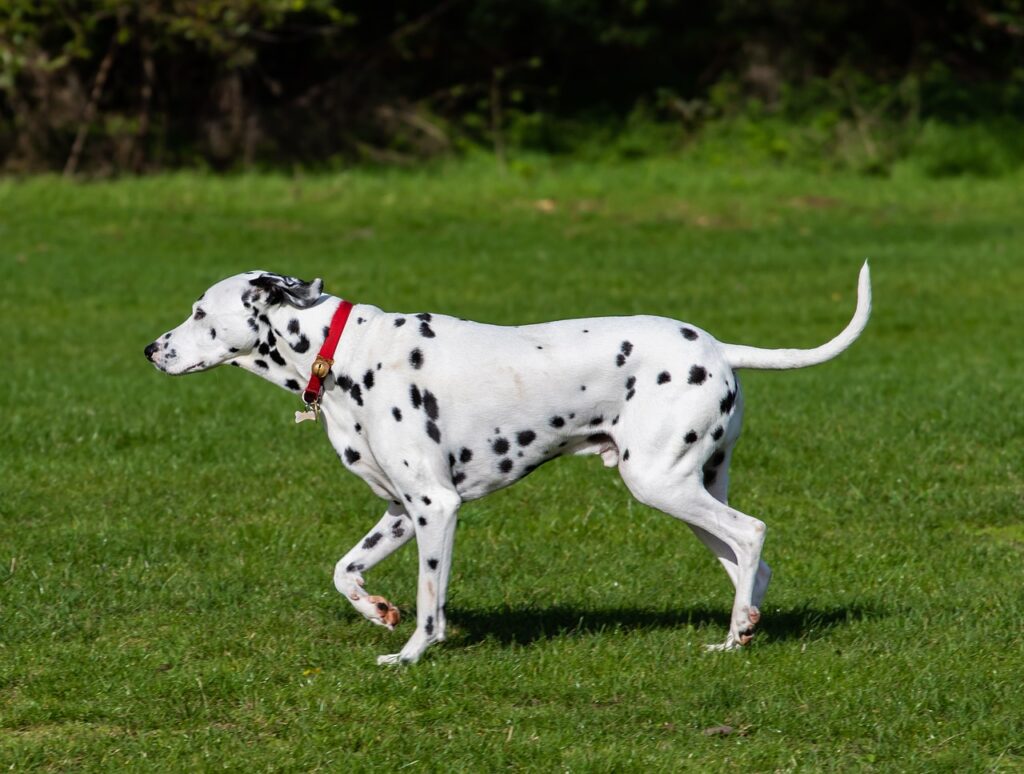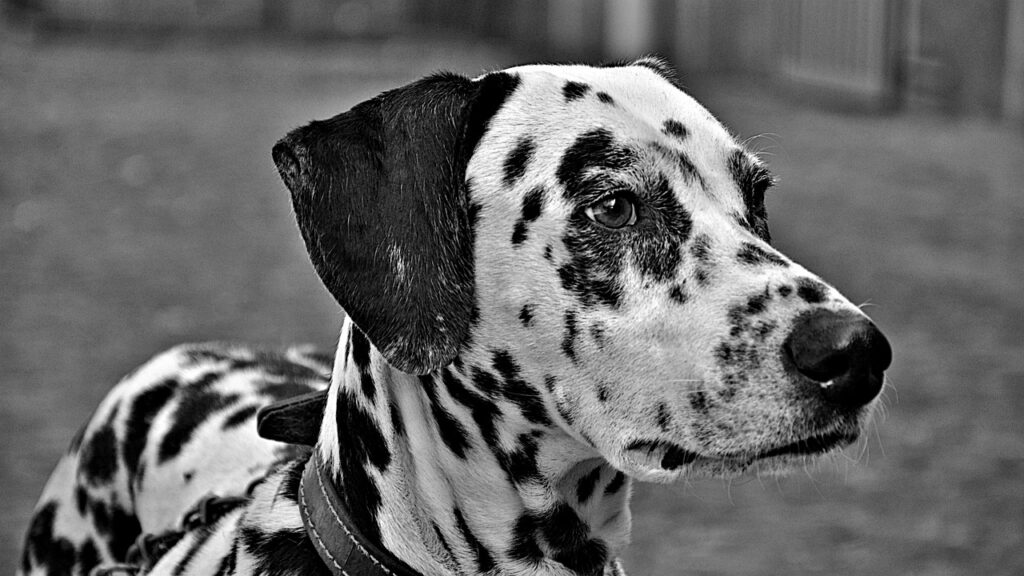Are you ready to embark on a wild and adventurous journey with a breed that’s full of energy, spots, and smiles? Look no further than the Dalmatian! Known for their striking appearance, unique history, and playful personalities, Dalmatians have captured the hearts of many dog lovers around the world.
In this comprehensive article, we will delve into the world of Dalmatians and discover what makes them so special. From their fascinating history to their distinct appearance, from their lively personality to their health and care, we’ll cover it all.
So, buckle up and get ready for a thrilling ride into the world of Dalmatians.
Table of Contents
Highlights of Dalmatians
- Spotted Perfection: Dalmatians are famous for their distinct spotted coat, which consists of black or liver spots on a white background. Their unique coat makes them instantly recognizable and sets them apart from other breeds.
- Lively and Energetic: Dalmatians are highly energetic dogs that thrive on physical activity and mental stimulation. They are known for their playful and lively personalities, and their boundless energy makes them perfect partners for outdoor adventures and activities.
- Versatile Working Dogs: Dalmatians were originally bred to work alongside horse-drawn carriages as carriage dogs, guarding the carriage and providing companionship to the horses. They are also known for their excellent sense of direction and were used as firehouse dogs in the past, accompanying fire trucks and assisting firefighters. Today, they excel in various dog sports, such as agility and obedience, and are often used as therapy dogs.
- Social Butterflies: Dalmatians are highly social dogs that thrive on human companionship. They are known for their friendly and outgoing nature, and they love being around people. They are great with children and can make wonderful family pets for the right household.
- Intelligent and Trainable: Dalmatians are intelligent dogs that are eager to please their owners. They respond well to positive reinforcement training methods and can learn a wide range of commands and tricks. However, they can also be independent and stubborn at times, so consistent training and patience are key to their success.
History of Dalmatians
The origins of Dalmatians can be traced back to Croatia, in the region of Dalmatia, from which they get their name. While their exact ancestry is not clear, it is believed that Dalmatians were developed as a breed in the 18th century. They were primarily used as carriage dogs, accompanying horse-drawn carriages and serving as guards and companions to the horses.
They were also known for their ability to run alongside carriages for long distances, making them valuable assets for transportation.
Dalmatians gained popularity in England in the 19th century, where they were used as coach dogs by the nobility. They were also employed as firehouse dogs, accompanying fire engines and serving as mascots for fire stations. Their unique appearance and ability to work alongside horses made them iconic and beloved figures in the firefighting community.
Today, Dalmatians are primarily kept as companion animals and are known for their playful and outgoing personalities.
They are also used in various dog sports, such as agility and obedience, and as therapy dogs, thanks to their friendly and social nature.
Appearance and Size of Dalmatians
One of the most distinctive features of Dalmatians is their spotted coat. Their coat is short and dense, with a smooth texture, and comes in a white base color with black or liver spots. The spots are well-defined and evenly distributed over the body, giving Dalmatians their unique and eye-catching appearance.
The spots can be either black or liver in color, and they can vary in size and shape, giving each Dalmatian their own individual pattern.

Dalmatians have a lean and athletic build, with a deep chest and a long tail that tapers to a point. They have a distinctive head shape with a long, narrow muzzle and dark, round eyes that are alert and expressive.
Their ears are medium-sized and set high on the head, carried close to the skull.
In terms of size, Dalmatians are considered medium to large dogs. Males typically stand between 22 to 24 inches (56 to 61 cm) tall at the shoulder, while females are slightly smaller, ranging from 20 to 22 inches (51 to 56 cm) in height.
Both males and females usually weigh between 45 to 70 pounds (20 to 32 kg).
Personality of Dalmatians
Dalmatians are known for their lively, outgoing, and friendly personalities. They are highly social dogs that thrive on human companionship and are always eager to please their owners. They are known to be great with children and can make wonderful family pets for the right household.
Dalmatians are also highly energetic dogs that require ample exercise and mental stimulation. They have a natural instinct to run and love to be active, so they are best suited for an active lifestyle. They enjoy playing fetch, going for runs, and participating in outdoor activities such as hiking and jogging.
Regular exercise is crucial for their physical and mental well-being, as it helps to channel their energy and prevent boredom.
As intelligent dogs, Dalmatians are quick learners and respond well to positive reinforcement training methods. However, they can also be independent and stubborn at times, so consistent training and patience are necessary.
Early socialization and training are important to ensure that Dalmatians grow up to be well-behaved and well-mannered dogs.
Health and Care for Dalmatians
Like all dog breeds, Dalmatians are prone to certain health issues that prospective owners should be aware of. One of the most well-known health concerns in Dalmatians is their predisposition to urinary stones. Dalmatians have a unique urinary system that makes them more prone to forming urate stones, which can cause discomfort and potentially lead to urinary tract obstruction.
To prevent this, it is important to feed them a balanced diet that is low in purine, a compound that contributes to stone formation, and to provide them with ample fresh water to stay hydrated.
Dalmatians are also prone to certain genetic health conditions, such as deafness and hip dysplasia. Regular veterinary care, including routine check-ups, vaccinations, and dental care, is essential to ensure their overall health and well-being.
It is also important to provide them with regular exercise, mental stimulation, and a healthy diet to maintain their optimal health.
In terms of grooming, Dalmatians have a short coat that is relatively easy to maintain. They shed moderately throughout the year and may require more frequent brushing during shedding season to remove loose fur and keep their coat clean and healthy. Regular bathing, nail trimming, and ear cleaning are also important aspects of their grooming routine.
Additionally, dental care is crucial to prevent dental issues, so brushing their teeth regularly and providing them with dental chews or toys is recommended.
Feeding Dalmatians
Feeding Dalmatians a balanced and nutritious diet is essential for their overall health and well-being. It is important to choose a high-quality dog food that is appropriate for their age, size, and activity level. Dalmatians have unique dietary needs due to their predisposition to urinary stones, and it is crucial to feed them a low-purine diet to prevent stone formation.
Consulting with a veterinarian or a canine nutritionist can help in determining the right diet for your Dalmatian.
It’s important to feed Dalmatians regular meals at specific times each day to establish a routine and prevent overeating, which can lead to obesity. Avoid feeding them table scraps or excessive treats, as this can disrupt their nutritional balance and contribute to weight gain.
Dalmatians are also known to have food allergies or sensitivities, so it’s important to monitor their diet and observe any signs of gastrointestinal issues or skin irritations. If you notice any changes in their appetite, digestion, or coat condition, consult with a veterinarian to identify and address any dietary concerns.
Children and Other Pets
Dalmatians are generally good with children and can make great playmates and companions. They are typically patient, gentle, and tolerant, but as with any dog, supervision is crucial when they are interacting with children to ensure both the child’s and the dog’s safety.
Teach children how to properly approach, handle, and interact with dogs, and always supervise their interactions to prevent any accidental harm.
When it comes to other pets, Dalmatians have a strong prey drive due to their history as hunting dogs. They may chase after small animals, such as cats or rodents, and may not be suitable for households with small pets.
Early socialization and training can help in managing their prey drive and introducing them to other pets, but it’s important to exercise caution and monitor their interactions with other animals.
Conclusion
In conclusion, Dalmatians are a unique and fascinating breed with a rich history, distinctive appearance, and vibrant personality. They are known for their iconic spots, athleticism, and friendly nature. However, they also require proper care and attention to ensure their health and well-being.
Regular exercise, mental stimulation, and a balanced diet are crucial for their physical and mental health. Grooming needs are relatively low, but regular brushing, bathing, nail trimming, and dental care are important aspects of their care routine.
It’s also important to provide them with proper training and socialization from an early age to ensure they grow up to be well-behaved and well-adjusted dogs.
Dalmatians can make great family pets, but it’s important to consider their exercise needs, energy levels, and potential health issues before bringing one into your home. They thrive in an active and stimulating environment where they can receive plenty of attention, exercise, and mental stimulation.
If you’re considering owning a Dalmatian, do thorough research, find a reputable breeder or rescue organization, and be prepared to commit to their specific needs for exercise, grooming, training, and health care. With proper care, Dalmatians can be loyal, loving, and fun companions that bring joy and excitement to your life.
So, whether you’re drawn to their unique appearance, playful personality, or rich history, owning a Dalmatian can be a rewarding and fulfilling experience. Just remember to provide them with the love, care, and attention they deserve, and you’ll have a loyal and loving companion by your side for years to come.
After all, as the saying goes, “A Dalmatian’s spots may be black, but their heart is always gold!”


Dennis and Becca, have always shared a passion for man’s best friend. As dog enthusiasts, they put together articles that inform, engage, and captivate fellow dog lovers.